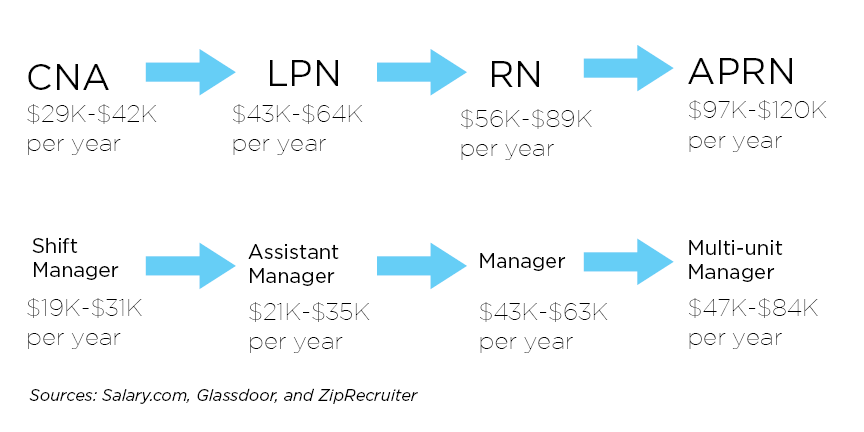You need a job—something that will pay the bills and not be too torturous.
You could apply to be a sandwich artist at your local sub shop. They’re always hiring, and how hard can it be to spread mayo, arrange cheese triangles and squirt an array of condiments out of a squeeze bottle for hours at a time?
But then you notice that there’s a CNA position open at your local skilled nursing and rehabilitation center, and the wheels in your mind slowly start turning. “Could I handle that type of job?” “Am I qualified?” “Would I need extra training?” “Am I up for the challenges?” “Could this turn into a long-term career choice?” “Does it offer opportunities for advancement?”
And, honestly, aren’t those the types of weighty questions you want to be asking—as opposed to, say, “Hey, do you want oil and vinegar on that?”
Even if caregiving is something you’ve never envisioned yourself doing before, now may be the perfect time to expand your horizons and seriously consider the possibilities.
Here are four reasons why:
- Caregiving positions have great benefits.
- It’s a good launchpad for a long-term career.
- Caregiving is fulfilling.
- It’s flexible, and you’ll be able to get a job no matter where you go.
Let’s examine each of these reasons in more detail:
Caregiving positions have great benefits
Let’s face it: The pandemic has been really hard on healthcare workers, with 66 percent of critical care nurses considering leaving their jobs because of it. Still, caregiving environments have been becoming steadily safer through widespread vaccinations and federal, state and local mandates. Caregivers remain extremely essential, so healthcare employers are making these jobs even more attractive. When you become a caregiver, you’ll be offered these benefits:
- Higher wages, up to 30 percent higher than recent wages, in some cases!
- Sign-on bonuses. Need an extra $250 for the holidays? Many caregiving jobs offer just that when you meet certain conditions.
- Tuition reimbursement: If you’d like to be a nurse, doctor of occupational therapy, rehab specialist or anything similar, become a caregiver. Many healthcare employees will pay for your schooling.
It’s a good launchpad for a long-term career
But why choose caregiving over other employers offering similar benefits? True, a warehouse job may offer wages and benefits that are similar to a local CNA position. But working in healthcare brings with it the opportunity to advance and turn your job into a long-term career.
There aren’t a whole lot of higher-paying jobs that are looking for warehouse experience.
If you start as a CNA, though, you can take the next step to LPN, RN, APRN, and beyond, increasing your salary and your level of impact as you go.
Here are two potential career paths and their full-time salaries, one starting as a CNA and the other starting as a shift manager at the average sub shop in California:

Caregiving is fulfilling
Living life with a sense of purpose is key to combating stress—and science backs this up.
A study asked middle-aged adults how strong of a sense of purpose they had. Then, the researchers tracked the participants for eight days to see how many stressful events they experienced and the corresponding emotions they felt.
They found that those who had a stronger sense of purpose, felt fewer negative emotions and even had fewer physical symptoms than their counterparts.
Translation? Sense of purpose = Less stress, more happiness.
If you’ve ever had the honor of getting to know an older person or someone going through a life-changing challenge, you know how inspiring it can be. There’s something about going through difficult experiences that helps us understand what really matters in life. Whether someone is recovering from a joint replacement surgery or pneumonia, each patient has some wisdom to share—either through their words or just the way they carry themselves. And as a caregiver, you get to experience that every day.
Caregiving is an amazing reason to get up in the morning and go to work. When people can’t help themselves, you are there to help them maintain dignity, feel joy, and pursue their goals. You know you are making a difference, and it makes their lives—and your life—better!

It’s flexible, and you’ll be able to get a job no matter where you go
If you’re interested in caregiving but feel hesitant at the idea of working in a skilled nursing facility, know that there are lots of options. You can choose your own hours to make a schedule that works with your lifestyle, and you can choose a position that best suits your preferences.
For example, you could work in a behavioral health facility. These patients are working on things like behavior modification and self-help skill development, and are often more independent when it comes to activities of daily living. Working with these patients is challenging and rewarding, and may be just the right fit for you.
Here are some other examples of entry-level caregiving jobs you can look into:
- A care partner assisting CNAs
- An activities assistant at a skilled nursing and rehabilitation center
- A dietary aid in a memory care facility
Plus, when you become a caregiver, you can be assured of finding a job no matter where you live. In fact, caregiving positions make up three of the top 10 in-demand jobs. Whether you live in a sprawling city or a tiny country town, your caregiving skills will be needed at a nearby hospital, skilled nursing facility, or home health company.
If you’ve ever thought about becoming a caregiver of some kind, now is the perfect time! It’s fulfilling, flexible, full of benefits, and the best kind of challenging. If all of this resonates with you, take the quiz to see if being a caregiver is right for you, and consider applying for a caregiving job.

